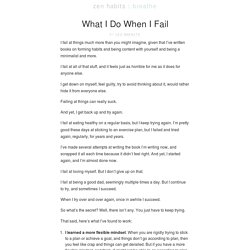

The tendency to avoid them, or engage in something else to take our mind off things is universal – unethical behavior, alcohol abuse and compensatory consumption are all examples of this. (...) The researchers note that practicing self-acceptance helps to reduce a person’s likelihood of engaging in damaging behavior and increases the likelihood that they will work toward improving the areas where they fall short. We introduce the idea that practicing self-acceptance is a more effective alternative to this type of self-destructive behavior. » (Kim & Gal, 2014). Why You Need To Stop Try Avoiding Failure. Source: DmZ/Shutterstock Imagine this scenario: You’re about to give a big presentation.

There’s an eager audience waiting to hear what you have to say. You believe in your idea and you know that this opportunity could lead to bigger and better things for you. If you were facing this scenario, what mindset would you likely be in? What thoughts would be running through your head? There’s a big difference. If you were focused on success, you might think about how you’ll deliver your presentation in a way that will resonate best with the audience.
Avoidance Goals Vs. The way you think about challenges greatly influences your performance. Here are six ways a focus on avoiding failure can backfire: 1. At first, this might seem like a strength: After all, don’t you want to keep working hard when a task is really tough? 2. The desire to avoid failure causes grater emotional distress. It’s also really hard to make good decisions when you’re feeling emotional. 3. 4. 5. 6. What I Do When I Fail. By Leo Babauta I fail at things much more than you might imagine, given that I’ve written books on forming habits and being content with yourself and being a minimalist and more.

I fail at all of that stuff, and it feels just as horrible for me as it does for anyone else. I get down on myself, feel guilty, try to avoid thinking about it, would rather hide it from everyone else. Failing at things can really suck. And yet, I get back up and try again. I fail at eating healthy on a regular basis, but I keep trying again. I’ve made several attempts at writing the book I’m writing now, and scrapped it all each time because it didn’t feel right. I fail at loving myself. I fail at being a good dad, seemingly multiple times a day. When I try over and over again, once in awhile I succeed.
So what’s the secret? The Best 3 Ways to Deal With Failure (Plus 5 Painful Ones To Avoid) Are your ways of dealing with everyday failures helping or hindering?

Acceptance, positive reframing and humour are the best three ways to deal with failure, according to psychological research. These three strategies make people feel the most satisfied at the end of the day. The study, published in the journal Anxiety, Stress & Coping, had 149 people keeping daily diaries for up to two weeks (Stoeber & Janssen, 2011). They reported the most irritating failure they had during the day, how they coped with it and how satisfied they felt at the end of the day. People spontaneously used all sorts of coping strategies. The results showed, though, that these three techniques left people feeling the most satisfied at the end of the day: Acceptance.Positive reframing – looking for the positives anywhere you can, perhaps by looking at what has been done rather than what hasn’t.Humour. In contrast, people who frequently used the following five common techniques felt worse at the end of the day:
Why You Need to Cry Over Spilt Milk. Failure. Guilt. Self-Acceptance. Failure & Vulnerability: Reframing How You Think. To be flawed is to be human, and yet we try hard to cultivate an air of perfection lest people actually see our weak spots.

We’re afraid of risking it all and faltering, and even more afraid to be seen as vulnerable. It might keep us safe, but this rigid mindset—the one that demands we nail it the first time, every time—is paralyzing. Fear of failure alone is enough to stop us from even trying anything new in the first place, but here’s a thought for you to mull over: our most vulnerable selves are often the ones that help us succeed in the world. We’re used to a narrative of negativity around failure and vulnerability, but it’s time to tell a new story.
Both of these emotional guests are much greater assets than first we think. So this is a call to reconsider what you think of your tender underbelly—a bid to regard with welcome the things we humans fear the most. Failure is your training ground for success Buy the bookRead in 10 minutes Vulnerability is a key component of courage. The Fear of Failure: It’s Not Your Job to Tell Yourself "No" Have you ever told yourself no?

I definitely have. 5 Ways to Stay Mentally Strong When You’re Not Feeling “Good Enough” Email.

Lack of Esteem.